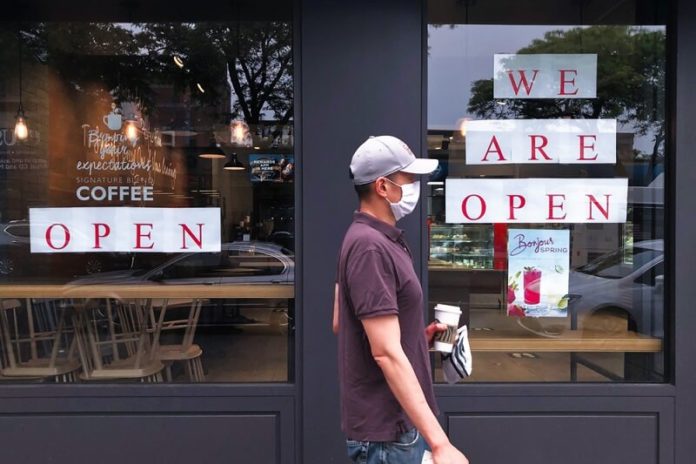It’s a tough time to be a small business owner. You’re tasked with reopening your business to customers or increasing capacity amidst shifting public health guidance, so there’s a lot to consider.
As American cities reopen, you may be wondering whether you should still require masks on premises of employees and guests, what state and local rules apply to your business, and just how long this uncertain “reopening” phase will last.
Here are 3 questions to consider as you reopen to ensure you have the protections and flexibility you need to respond to emerging public health concerns in the future.
1. What Is the Reopening Plan for Your Business?
Just because the local standards have changed doesn’t mean you’re obligated to drop your mask mandate or stop accepting mail orders. Your reopening plan should be yours, and it must take into account what your business, employees, and customers need.
If you’re not sure how your employees or customers are feeling about returning to in-person shopping and socializing, ask what they think. Taking an informal survey can help you check your assumptions about people’s expectations for “the new normal” and better understand how you can adapt your operations or product offerings to meet them.
If you’re not sure where to begin, the US Chamber of Commerce has created a detailed reopening guide to walk you through this process.
2. What Best Practices for Public Health Will You Put in Place?
Updating your employee handbook may not sound like fun, but it’s an incredibly practical exercise. Put your new health and safety standards in writing to ensure that you’ve thought through the implications of the measures you’ll require and think through how you’ll communicate standards to employees and customers.
If your plan is simply to follow your local city or state’s policies, you should also consult with OSHA’s guidance on reopening as these national standards for workplace safety still apply. To keep up with regulations, you may want to opt to create a living, digital document that links to the webpage where current standards are housed. Whatever medium you choose, your employees need to know what to do, how to do it, and what the rationale behind safety procedures are.
For example, if you’re planning to continue to enforce social distancing in the workplace, you may need to rearrange desk spaces or your storefront. Employees will need to know how to address spatial concerns with guests, and you’ll need to put a strategy in place to communicate those requirements onsite. You may be required to supply PPE or other COVID-related supplies for their safety.
3. Revisit Your Small Business Insurance Coverage
Whether you successfully applied for and received a PPP loan, you found a niche in the pandemic economy where your business filled a need, or you’re just sweeping the dust off the counter for the first time since March 2020, your business has undergone some kind of transformation in the past year. It’s important that your insurance policies meet your current needs.
Once you have your updated reopening plan and safety measures aligned, it’s time to revisit your insurance policy to confirm you’re aligned with state requirements and that it matches your current risk tolerance. In addition to your business owner’s policy, in light of the recent spate of cyberattacks we’ve seen around the country, you may want to consider cyber insurance. If you provide expertise or personal services, you may find that it’s time to purchase professional liability insurance.
Thanks to online insurers, you can research your options, get a quote, and add coverage anytime, anywhere, and from any mobile device.
Flexibility Is the Key to a Smooth Reopening
You’ve been fielding questions and rolling with the punches for months. You know how quickly a city can enter and exit a phase of lockdown and reopening, and you’re likely acutely aware of just how precarious your business is a public state of emergency.
You’ve learned a lot in the past year, and “reopening” doesn’t mean tucking those lessons away for the next public health crisis or natural disaster. As you bring more staff back to the workplace, keep flexibility front of mind and aim to build a more flexible, adaptable future for your small business.
Stephanie N. Blahut is CMO and Co-Founder at B2Z Insurance. B2Z Insurance is a new small business insurance company that provides coverage for on-the-go business owners: simple explanations, easy application, digital quotes, and mobile claims. Stephanie is a seasoned digital marketing professional whose experience spans the insurance, publishing, and software industries. As B2Z’s CMO she leads their digital-first customer acquisition and marketing strategy.
Small business reopening stock photo by Kits Pix/Shutterstock







